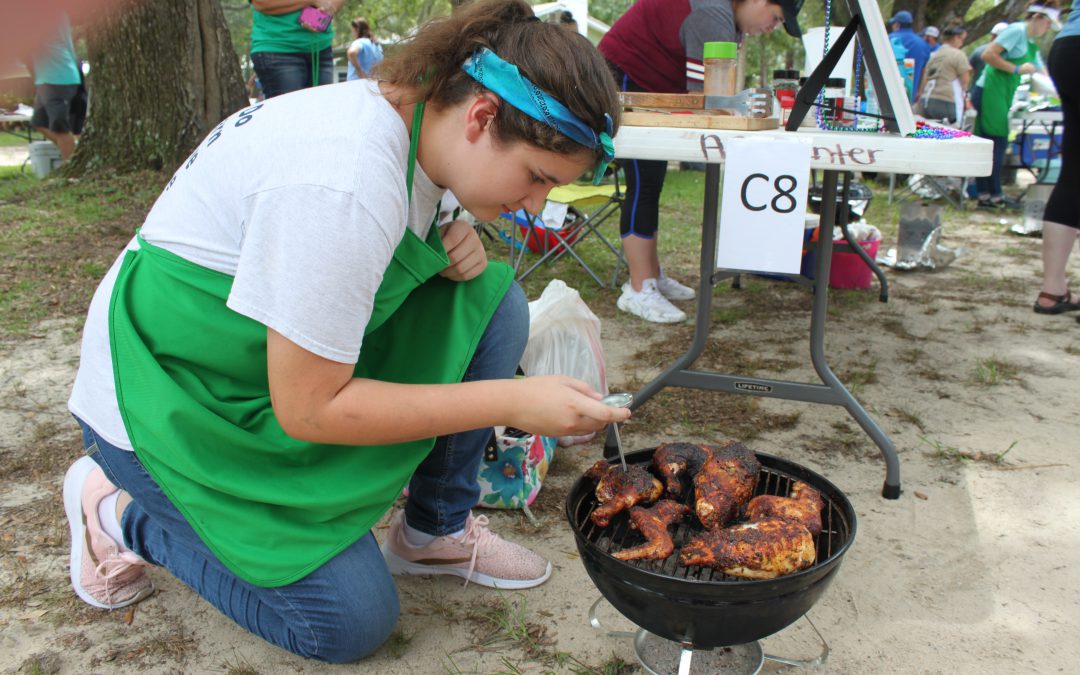
by bestevez | Sep 20, 2019
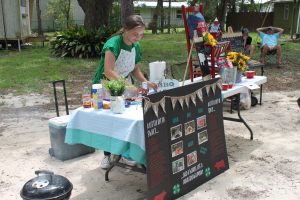
A youth competing in the NW District Tailgating Competition carefully prepares her protein.
Did you get to do any grilling this summer? Over 110 youth from throughout the Florida Panhandle participated in 2019 4-H summer day camps that taught them how to grill, food and fire safety, and cooking skills.
Ten different FL Panhandle counties provided nine unique day camps on grilling. Then, on July 20, 2019, 37 youth from eight counties participated in the Northwest District Tailgating Contest at the Washington County Ag Center. Youth participated in competitions in beef, pork, poultry, and shrimp divisions and were judged on their food and fire safety skills around the grill and the taste of their chosen protein. In all, $3,200 was awarded to Panhandle youth for placing 1st– 4th in their competitions.
Now, the top two youth in each protein category will compete at the Florida 4-H Tailgating Contest in Gainesville on September 28th. They will compete against youth from across Florida for an opportunity to win college scholarships. For the state contest, the first place winner in each protein area receives a $1,500 college scholarship and the second place winner receives a $1,000 college scholarship. September 28th is also the 4-H Day with the Florida Gators. You can get tickets for the football game for just $20 and sit with 4-H members from around the state. For more information, visit http://florida4h.org/blog/4-h-day-at-florida-gators-football-vs-towson/.
Join us as we cheer on the following NW District 4-H participants as they represent us at the Florida 4-H State Tailgating Contest:
- Beef Division
- Colton Serpas-Washington County
- Alan B.-Escambia County
- Pork Division
- Lillian Sparks-Washington County
- Brent Young-Holmes County
- Poultry Division
- Sarah Crandall-Jefferson County
- Rylee Sweat-Walton County
- Jamison Scheffer-Washington County
- Shrimp Division
- Claire Diamond-Escambia County
- Evelyn Moyers-Bay County
If you are interested in furthering your grilling skills, please check out the Florida 4-H Tailgate Series of EDIS documents at https://edis.ifas.ufl.edu/topic_series_florida_4-h_tailgate. If you would like more information on the Tailgating Contest so you or youth that you work with can participate next year, please visit http://florida4h.org/programsandevents_/animalscience/4-h-tailgating-contest/.
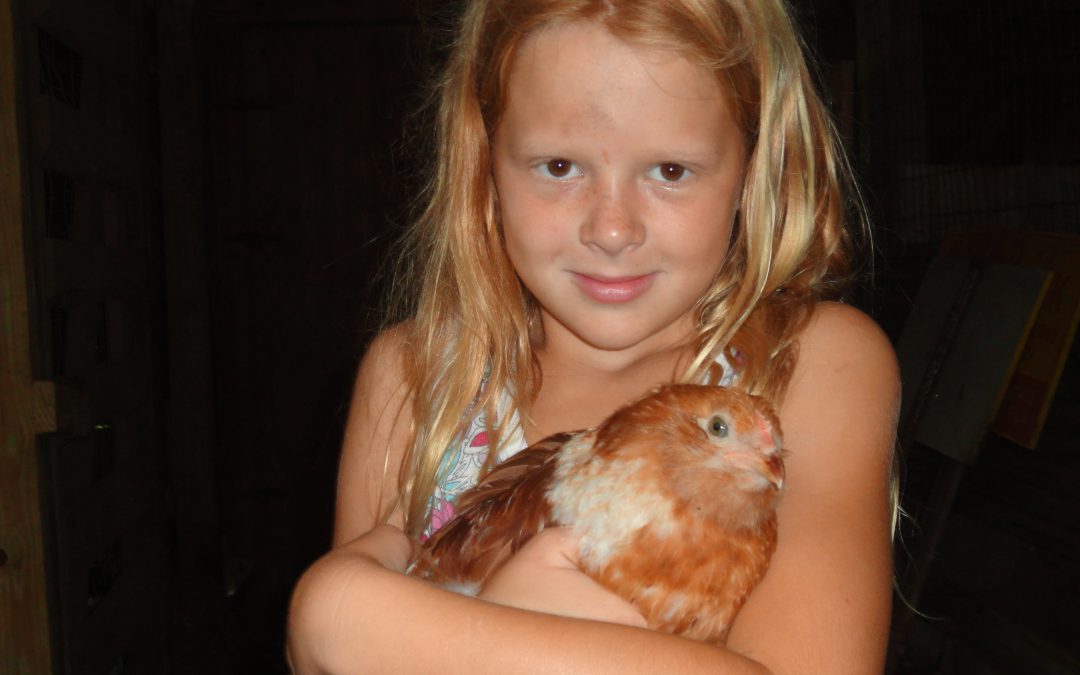
by Julie Pigott Dillard | Sep 13, 2019
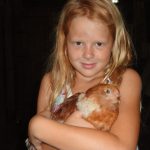
Learning responsibility is just one of the many skills learned through 4-H Chick Chain.
Since March, 4-Hers have watched their chicks grow day by day into pullets. Spanning six months, the 4-H Chick Chain project teaches youth how to care for growing chickens. They’ve learned all about nutrition, housing needs, and disease management along with showmanship preparation and practices. Youth kept project books of their experiences, taking note of expenses, and breed information. Youth who participated in the past 2018 project have continued to care for their chickens who are now laying eggs and providing a food source for their family.
On September 28th, youth will participate in the 2019 4-H Chick Chain Show. For 2019 projects, youth will exhibit two of their best project pullets (a pullet is less than one year old at laying age), participate in showmanship to show off their handling skills, and enjoy a skill-a-thon to show what information and knowledge they’ve learned during the year. For 2018 projects, those youth will bring their two best layers which are now in peak egg production.
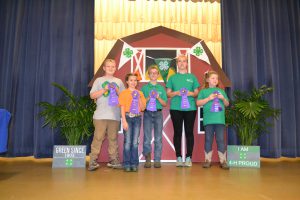
Best of Breed winners from the 2018 4-H Chick Chain
2019 4-H Chick Chain Show Details
For youth participating in the 2019 4-H Chick Chain Show, remember to register through your 4HOnline profile by midnight, September 13th. Your project book and photography entries are also due to your 4-H agent that day.
Youth will earn awards in skill-a-thon and showmanship. Awards will be given to best of breed and overall champions will be named.
Here’s a timeline of events for the 2019 4-H Chick Show:
Saturday, September 28, 2019
Washington County Ag Center – 1424 Jackson Ave, Chipley, FL – check-in on the west end of the building.
- If your flock is NPIP certified, bring your card to check-in
- 8-8:30 am – District II Check-in (Walton, Washington)
- 9-9:30 am – District III Check-in (Leon, Liberty, Jefferson, Wakulla, Franklin, Gadsden)
- 10-10:30 am – District I Check-in (Escambia, Okaloosa, Santa Rosa)
As soon as birds are checked-in, youth will participate in showmanship and skill-a-thon with awards tentatively scheduled for 12 pm.
Resources:
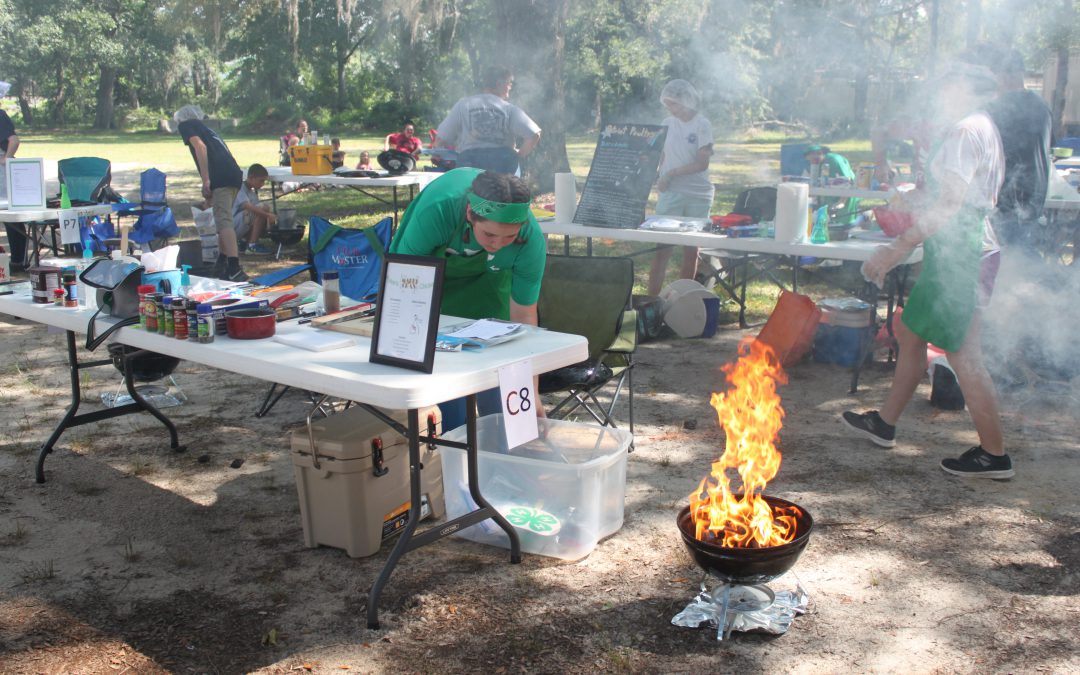
by bestevez | May 29, 2019
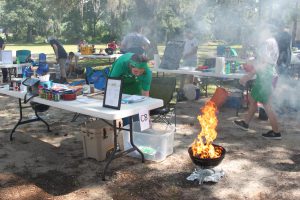
A 2018 NW District 4-H Tailgating Contest participant prepares to grill
Imagine the smell of a charcoal grill on a breezy summer day. A neighbor is grilling in their backyard, and you wish you were invited over for dinner. Would it be even better if it was your child or grandchild doing the grilling for you?
Fire up Your Grill!
4-H members have been firing up their charcoal grills and participating in the Florida 4-H Tailgating Contest since 2016. Designed to promote the use of animal protein in the diet, youth learn the art and science of safely preparing beef, pork, poultry, and seafood in an outdoor setting providing opportunities for 4-H youth to develop life skills, including decision making and healthy lifestyle choices.
In the Florida 4-H Tailgating Contest, youth grill two, 6-8 ounce portions of one of the following proteins:
- beef
- pork
- poultry – turkey breast or half chicken
- shrimp – fresh, headless and de-veined
While youth are grilling, judges observe food and fire safety actions and ask questions about the recipe and safety knowledge. A team of judges evaluates the cooked product by taste testing and scoring each entry.
4-H Tailgating District Contest
After youth compete at county contests or participate in day camps, they can register for the district contest. There are four district contests hosted throughout the state including our Northwest District contest held at the Washington County Ag Center on July 20, 2019. Cash prizes at the district level are awarded in each protein category – 1st place $400, 2nd place $250, 3rd place $100 and 4th place $50.

Scholarships and prizes are awarded thanks to these sponsors.
4-H Tailgating State Contest
The top two winners from each protein are then eligible to compete in the state contest held at the University of Florida on September 28, 2019. For the state contest, the 1st place winner in each protein area receives a $1,500 college scholarship and the 2nd place winner receives a $1,000 college scholarship.
Since the Florida 4-H Tailgating contest began in 2016, over $63,000 in scholarship money has been awarded to Florida 4-H members made possible by sponsorships from Winn-Dixie, National Beef, and Sonny’s.
Learn More at a Tailgating Day Camp
Last summer, over 100 youth attended day camps to learn about identifying cuts of meat, preventing food cross contamination and food-borne illnesses, grilling techniques, food safety and fire safety. Contact your local UF/IFAS Extension office to find a grilling day camp near you so you can participate in the 2019 Northwest District 4-H Tailgating Contest! Follow us on Facebook to see event details!
Resources
by Prudence Caskey | May 22, 2019
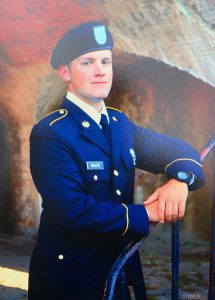
Santa Rosa 4-H member, Private 1st Class Wolf, serves his country in the United States Army.
Receiving an official title can be very exciting for a new employee. Santa Rosa County 4-H member, Payton Wolfe has a new title and he hasn’t even graduated from high school yet. His new title is now Private 1st Class Wolfe. You see, Payton is serving the United States of America in the Army. Wolfe completed his Basic Combat Training during the summer between his Junior and Senior years of high school. He has officially been in the Army for quite some time now.
Payton Wolfe has a love of animal husbandry and has hatched over 5,000 eggs throughout his high school career. During his many years in 4-H, he has raised numerous types of poultry including quail, chickens, pheasants, turkeys and ducks. “I even had a couple of cows, but they were really just for pets, I never showed them,” Payton explained.
Along with animals, Payton has learned to have a heart of service for a long time. He has completed over 300 hours of community service while in Santa Rosa County 4-H. He has served his club as an officer, his community in service projects whenever needed, and now Payton will serve his country in the United States Army for six years. Enrolling in the Army Veterinarian Specialist program seemed like a natural fit for him. He will be helping care for bomb dogs and horses. Thank you for your dedication and service to our country Private First Class Wolfe!
We are proud that Payton is using the skills he learned as a member of 4-H to protect our country and are excited to see how he will continue to serve his world in the years to come. To find out more information about 4-H programs that can offer essential life skills such as leadership, independence, and goal setting to your children so that they will grow up to become successful members of society and have a heart of service like Payton, please contact your local UF/ IFAS County Extension Office, or follow us on Facebook.
by Julie Pigott Dillard | Mar 1, 2019
 Registration opens today for the 2019 4-H Chick Chain project! This project teaches youth how to raise baby chicks to laying age using science-based best practices. At the end of the project, youth compete in a showmanship and skill-a-thon contest to test their knowledge and also exhibit their birds for judging and awards.
Registration opens today for the 2019 4-H Chick Chain project! This project teaches youth how to raise baby chicks to laying age using science-based best practices. At the end of the project, youth compete in a showmanship and skill-a-thon contest to test their knowledge and also exhibit their birds for judging and awards.
HOW DOES THE 4-H CHICK CHAIN PROJECT WORK?
Purchase or hatch your own chicks during the month of March. The number you choose to purchase or hatch is up to you, but we recommend that you begin with at least three chicks.
Chicks must be from the following breeds:
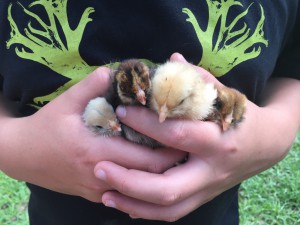
Chicken breeds have unique needs and personalities. Do some research before you choose your breed.
- Australorp
- Barred Rock
- Brahma
- Jersey Giant
- Leghorn
- Orpington
- Rhode Island Red
- Silky
- Welsummer
- Wyandotte
There is an orientation webinar and a hands-on workshop to get you ready for the show. Your 4-H Agent or project volunteer can also make a home visit to check up on your progress.
HOW DO I SIGN UP?
4-H Chick Chain is open to all youth ages 5-18 who are enrolled or enroll as new members in 4-H. Enroll now.
Registration opens March 1 and closes March 31 in 4honline.
Families can share a project, but each youth should be individually registered.
Members who participated in the 2018 4-H Chick Chain project can register as a returning production project.
REGISTRATION FEES:
- 2019 New Project: $20
- 2018 Returning Production Project: $10
To learn all about the project, read the 2019 4-H Chick Chain Youth Project Guide.
If you’re an adult with a love of poultry that you’d like to share with others, consider becoming a 4-H poultry project leader. Our poultry programs include 4-H Embryology in the Classroom, 4-H Chick Chain, and 4-H livestock clubs. Visit http://florida4h.org/volunteers to find out more. To learn more about 4-H in your county, contact your local UF/IFAS Extension Office.
Still have questions about 4-H Chick Chain? Contact project chair – Julie P. Dillard – juliepd@ufl.edu or call 850.638.6180.

Best of Breed winners from the 2018 4-H Chick Chain.
by Julie Pigott Dillard | Feb 8, 2019
 Well’s FRM was one of my favorite places to go with my dad when I was a little girl…especially when baby chicks arrived. With spring right around the corner, local feed stores will be getting shipments of baby chicks soon. Have you thought about raising baby chicks but are unsure how to? Then join us in the 4-H Chick Chain project!
Well’s FRM was one of my favorite places to go with my dad when I was a little girl…especially when baby chicks arrived. With spring right around the corner, local feed stores will be getting shipments of baby chicks soon. Have you thought about raising baby chicks but are unsure how to? Then join us in the 4-H Chick Chain project!
4-H Chick Chain teaches youth how to raise baby chicks to laying age using science-based best practices. At the end of the project, youth compete in a showmanship and skill-a-thon contest to test their knowledge and also exhibit their birds for judging and awards.
HOW DOES THE 4-H CHICK CHAIN PROJECT WORK?
You’ll purchase or hatch your own chicks during the month of March 2019. The number you choose to purchase or hatch is up to you, but we recommend that you begin with at least three chicks.
Chicks must be from the following breeds:

Chicken breeds have unique needs and personalities. Do some research before you choose your breed.
- Australorp
- Barred Rock
- Brahma
- Jersey Giant
- Leghorn
- Orpington
- Rhode Island Red
- Silky
- Welsummer
- Wyandotte
The 4-H Chick Chain is designed to take you step-by-step through the process of raising your birds to healthy laying age.
There is an orientation webinar and a hands-on workshop to get you ready for the show you’ll attend during the summer. Your 4-H Agent or project volunteer can also make a home visit to check up on your progress.
HOW DO I SIGN UP?
4-H Chick Chain is open to all youth ages 5-18 who are enrolled or enroll as new members in 4-H. Enroll now.
Registration opens March 1 and closes March 31 in 4honline.
Families can share a project, but each youth should be individually registered.
Members who participated in the 2018 4-H Chick Chain project can register as a returning production project.
REGISTRATION FEES:
- 2019 New Project: $20
- 2018 Returning Production Project: $10
To learn all about the project, read the 2019 4-H Chick Chain Youth Project Guide.
If you’re an adult with a love of poultry that you’d like to share with others, consider becoming a 4-H poultry project leader. Our programs include 4-H Embryology in the Classroom, 4-H Chick Chain, and 4-H livestock clubs. Visit http://florida4h.org/volunteers to find out more. To learn more about 4-H in your county, contact your local UF/IFAS Extension Office.
Still have questions about 4-H Chick Chain? Contact project chair – Julie P. Dillard – juliepd@ufl.edu or call 850.638.6180.

Best of Breed winners from the 2018 4-H Chick Chain.












